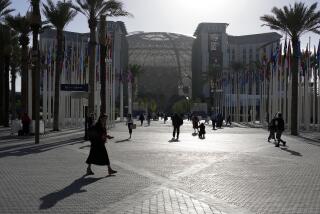Reshaping the World
- Share via
It will take months and perhaps years for tangible results of last week’s remarkable Communist Party conference in Moscow to manifest themselves. But General Secretary Mikhail S. Gorbachev almost certainly had it right when he said that changes in Soviet life that the conference was designed to validate were irreversible. The same is true not only of East-West relations but also of the way the West will shape policies in the future.
For most Westerners the conference was a flimsy copy of democracy, but it was real enough to move some of the present generation of Soviets to tears. It moved others to fire off telegrams to the Kremlin to say what they thought about the sharp exchanges among Communist leaders for whom wooden was the preferred style for decades.
The telegrams were what Gorbachev wanted as he piloted the congress into its berth in history. In fact, a flimsy copy of democracy is his best hope of getting grass-roots support for keeping the Communist Party bureaucracy away from the working parts of government and the economy until he can get both performing more smoothly. It will be easier for Gorbachev to weed out the party’s dead weight if, for example, Soviet citizens learn to holler at the agriculture minister about a shortage of meat instead of grumbling at the butcher. The party conference was a stunning lesson in hollering, watched in wonder by millions of Soviets who had simply never seen anything like it in their lives.
The general secretary’s perestroika campaign, his effort to reshape the way the Soviet Union’s government and economy work, is as fascinating to the West as it is to the Soviets, millions of whom had despaired of knowing anything better than numb acceptance of the bare minimums in life.
Changes in Moscow will provoke similar changes in the Western world. How much of the tension can be wrung out of the superpower relationship between the United States and the Soviet Union is no more than a good guess. But relations had already changed enough last week for the Pentagon to stage a series of flashy war games for an important visitor, Marshal Sergei F. Akhromeyev, chief of the Soviet armed forces general staff. And after a U.S. Navy ship shot down a civilian Iranian Airbus over the Persian Gulf, killing the 290 passengers and crew members, a Soviet response that only months ago would have had the word brutality somewhere in it went more like this: “We warned you that something terrible would happen one day with that concentration of force. Now it has.”
In the context of past superpower relations, that remark borders on disengagement. Akhromeyev will not just watch troops maneuver and climb into a B-1 cockpit; he will discuss with top Pentagon officials how forces in both countries can be rebuilt to reduce their capability for sudden offensive thrusts anywhere in the world.
The Moscow party conference should also mean a change in White House perspective on foreign policy. For nearly 40 years American relations with other countries have had less to do with the countries themselves than with whether they had a role to play in the military standoff between East and West. The need for taking that into account never will go away entirely, but for now it is not the most burning question. By fastening the attention of both superpowers on their own problems, the conference may start a trend toward looking at the world the way it is rather than the way it should be. That would be refreshing.
More to Read
Sign up for Essential California
The most important California stories and recommendations in your inbox every morning.
You may occasionally receive promotional content from the Los Angeles Times.













